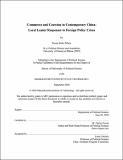Commerce and coercion in contemporary China : local leader responses to foreign policy crises
Author(s)
Miura, Kacie Kieko.
Download1249957188-MIT.pdf (102.7Mb)
Other Contributors
Massachusetts Institute of Technology. Department of Political Science.
Advisor
M. Taylor Fravel.
Terms of use
Metadata
Show full item recordAbstract
During foreign policy crises involving China and its most important foreign economic partners, some local leaders in China willingly threaten foreign commercial interests, while others attempt to protect foreign commerce from diplomatic tensions. This subnational variation in participation in economic retaliation is surprising given the presence of a strong central government. As key stewards of foreign commerce, local leader participation in state punishment is critical to China's coercive capacity. I argue that the Chinese Communist Party's system of personnel management, which emphasizes both meritocratic and patronage elements, generates cross-cutting incentives that shape local leader responses to foreign policy crises. The first is economic dependence, or whether a locality's commercial ties to the targeted state are essential for local economic growth. The second is whether local leaders are politically vulnerable to demotion or disciplinary punishment, either because they lack powerful patrons or because their localities recently experienced social unrest. While economic dependence creates incentives to shield foreign commerce, politically vulnerable leaders have incentives to shore up their patriotic credentials by participating in economic retaliation. I evaluate this theory of discretionary local leader behavior in the context of recent foreign policy crises in China's relations with Japan, South Korea, and the United States. I conduct in-depth case studies of city leader responses in eight cities: Dalian, Shenyang, Shanghai, Chongqing, Xi'an, Chengdu, Guangzhou, and Wuhan. For these cases, I draw on data from interviews, conducted during 14 months of fieldwork in China, with local government officials, foreign consular officials, business representatives, journalists, and scholars. I also use computer-assisted text analysis methods to build an original dataset of sentiment analysis scores of Chinese language local official media coverage, which provides insights to the policy preferences of local leaders. I assess how official newspapers in around 65 cities covered Japan, South Korea, and the United States during the height of the foreign policy crises involving each. Cross-city statistical analyses show that anti-foreign propaganda tends to be most intense in cities where local leaders are politically vulnerable and not economically dependent.
Description
Thesis: Ph. D., Massachusetts Institute of Technology, Department of Political Science, September, 2020 Cataloged from the official PDF version of thesis. Includes bibliographical references (pages 283-311).
Date issued
2020Department
Massachusetts Institute of Technology. Department of Political SciencePublisher
Massachusetts Institute of Technology
Keywords
Political Science.